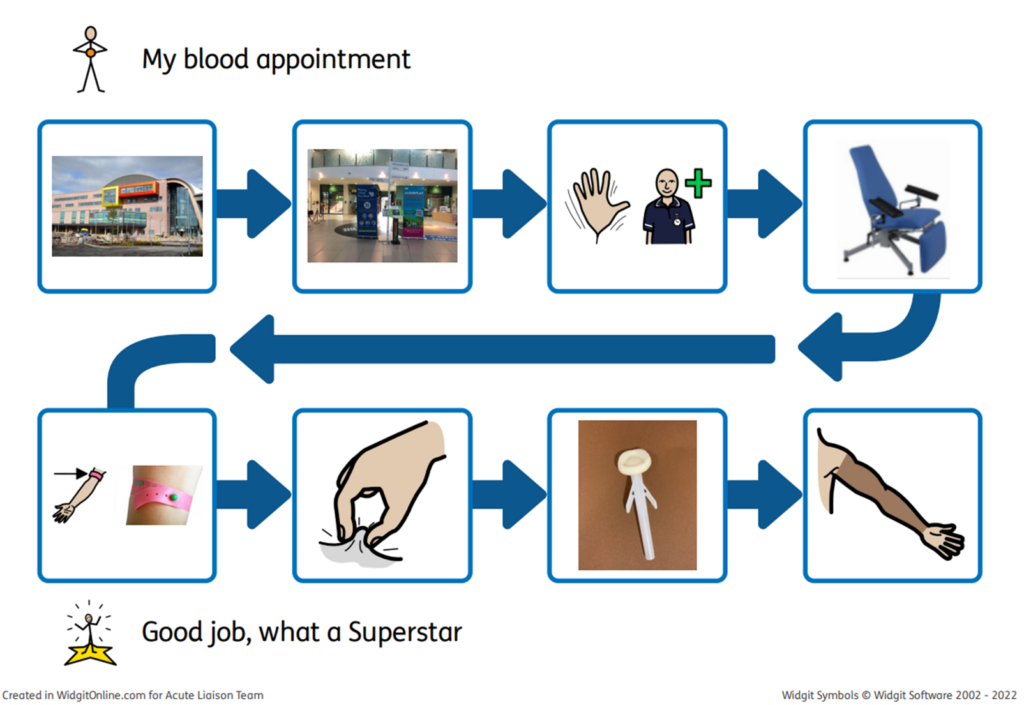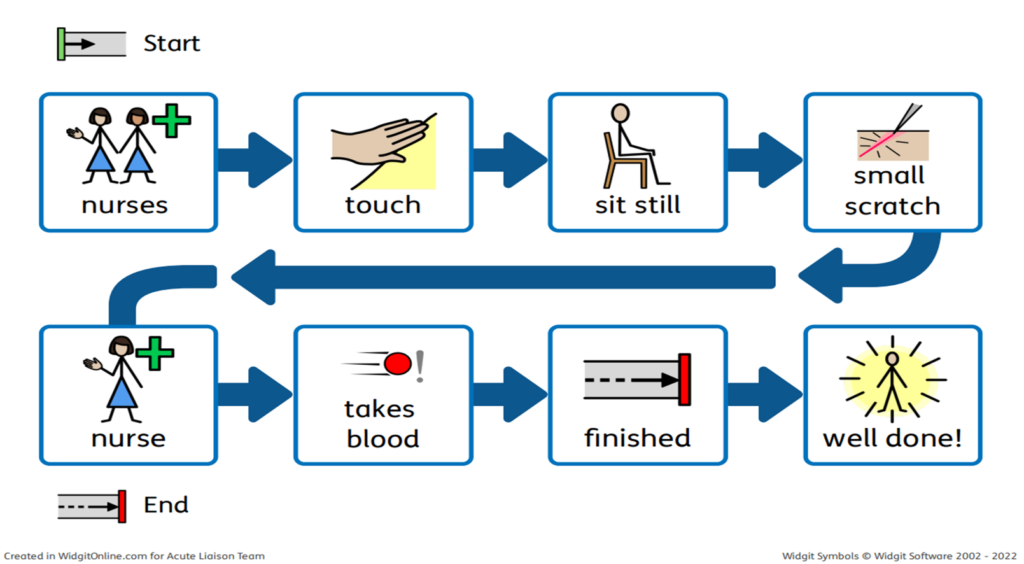On this page
- Download the leaflet
- Introduction
- How to book a blood test appointment.
- GP bloods
- Alder Hey bloods
- Why do children and young people need a blood test?
- Numbing cream (Magic Cream) and Cold Spray
- Buzzy Bee
- Preparation advice
- Health play specialist
- What will happen during the appointment?
- What should I expect to happen once my Child or Young Person has had this procedure?
Download the leaflet
PIAG 478 Phlebotomy Blood Tests (486kB pdf)
Introduction
This leaflet aims to provide you with information about the phlebotomy clinic and what to expect when you and your Child or Young Person attends their appointment.
How to book a blood test appointment.
The phlebotomy service is accessible by appointment ONLY.
Blood tests appointments are:
- GP referrals are available from 8:30am-4:15pm Monday-Friday.
- Alder Hey referrals are from 8:30am-5:30pm Monday-Friday.
Please inform us if your Child or Young Person has a diagnosis of autism, has a learning disability, is needle phobic or has a mental health condition that requires reasonable adjustments on their visit to the department i.e. a quieter space to wait in, longer appointments etc.
GP bloods
If your GP has requested that you need to attend for a blood test, please call our Phlebotomy phone line on 0151 282 4589. This line is open Monday-Friday from 9am-5pm (excluding bank holidays).
Please inform us at the time of booking if you require a fasting blood test. This will then enable us to book you an early morning appointment. If fasting bloods have been requested, please do not eat or drink (plain water is fine) for 8-10 hours prior to your appointment.
It is essential that you bring your blood test request form, provided by your GP with you to the appointment.
Blood tests are also available in the community for children and young persons aged 12 and above. This will need to be booked directly with your GP. Please note that patients already under the care of Alder Hey should have their bloods done here rather than in the community.
Alder Hey bloods
These bloods can be pre-booked in advance or booked on the day depending on the needs of your Child or Young Person.
- For pre-booking blood tests, please call our Phlebotomy phone line on 0151 282 4589. This line is open Monday-Friday from 9am-5pm (excluding bank holidays).
- For on the day bloods please make your way to G2 reception on the ground floor in Outpatients and the next slot will be booked for you.
Why do children and young people need a blood test?
Children and Young People may need to have a blood test because they have been feeling unwell. The blood test will help us find out why. Bloods tests can also be used to monitor existing conditions, treatments and medications. If you are not sure why the blood tests are needed, please ask the doctor or nurse who has requested them.
Numbing cream (Magic Cream) and Cold Spray
When having a blood test done, it is possible to have the area numbed first with a topical anesthetic cream. (Ametop or Emla) Your Childs or Young Persons GP may prescribe this for you. If your GP has prescribed this for you, we suggest it should be applied on the inner crease of the elbows, or on the backs of the hands and should be covered with a clear dressing. It can also be purchased from your local pharmacy.
Apply Ametop using a transparent film dressing to cover the cream and leave in place for 30 minutes. Once removed, Ametop continues to work for up to 4 hours after the cream has been removed. If the area becomes red, swollen or itchy, please remove straight away. An alternative to Ametop is Emla cream. This cream needs to be left on for one hour. It is a good alternative if Ametop can not be used due to allergies.
The numbing cream can be applied at the Phlebotomy clinic. If you do require this, please arrive 30-40 minutes before your appointment time and inform reception that you require the numbing cream to be applied. If you can not arrive early for the numbing cream to be applied, you can request to have cold spray instead.
Cold spray is applied and works instantly, the phlebotomist will spray this on the arm or hand, it does feel very cold, but it doesn’t hurt. Please note if a Child or Young Person has very small veins, or is known to have difficult access we would recommend the numbing cream rather than the cold spray. The nurse can review this with you on the day.
Please inform staff if your Child or Young Person has any allergies prior to using Ametop, Emla or the cold spray.
Buzzy Bee
The Buzzy® device can be used to reduce or block pain from needle procedures such as blood tests. This can be used with or without numbing cream and cold spray. It can also be used with the wings frozen or without wings.

Preparation advice
Having a blood test can be quite unsettling for your Child or Young Person. It is always a good idea to prepare your child before having one done. Talk to your child before hand explain what might happen, tell them it will be over with quickly, be honest with them and give them lots of reassurance.
Parents are strongly encouraged to stay and help their child during the procedure, your child may want to sit on your lap or cuddle you whilst having their blood test done. Distracting your child during the procedure will help take their minds off what is happening, we encourage you to bring along their favourite toy, teddy, book or electronic device that may help them to do this. Other top tips includes keeping arms and hands warm prior to the appointment, particular in winter as this will help with the blood test. Please encourage your Child or Young Person to drink plenty of fluids prior to their appointment as this will help the phlebotomist to find a vein. If your child is for fasting bloods they can be given water but no food, milk or chewing gum.
We have a number of resources for use to help prepare your child or young person for coming into hospital and having a blood test which you may find useful. Please look at these resources and decide if they are useful for you and your child/young person.
- We have a story board which can be found on the following page of this leaflet
- There is a workbooklet called “Terrys trip to Alder Hey” that you can work through with your child.
- There is also a animation available to watch.
All these resources can be found on the Alder Hey web site.
Health play specialist
We have a health play team within the Outpatients Department, which is made up of a Health Play Specialist and a Play Assistant. A Health Play Specialist uses therapeutic play, tools and strategies to prepare and distract children and young people during medical procedures. A Health Play Specialist is available between the hours of 8-4, to provide support on the day for your blood test. Please let a member of the outpatient team know if you would like the support of the play team.
What will happen during the appointment?
On arrival please book into either G2 reception or Catkin reception (depending on where your blood test is). You will be called into the room by one of the phlebotomists who will introduce themselves and explain all about what will happen during the procedure.
The phlebotomist will review the blood requests and will discuss with you the most suitable way to collect the blood sample. There are two different ways we can collect blood from Children and Young people:
- From the vein with a very small butterfly needle or
- Finger/heel prick.
How we collect the blood sample will depend on the volume of blood and specific blood tests that are required. We can have this discussion with you and give all the information you require during your appointment.
What should I expect to happen once my Child or Young Person has had this procedure?
It is quite common for some localised bruising to occur after a blood test, this will normally go away in 3-5 days, however if it does not improve, is swollen or painful then please contact the clinic or seek medical advice.
Once the blood samples have been taken they are sent to the laboratory for testing. How long the test results take to come back can vary, some can be completed within a few days but other more complex tests can take a few weeks. Once completed the results will be sent directly to the doctor who requested them, this is usually a consultant within the hospital or your Childs or Young Person’s GP. The doctor will usually inform you of the results by letter, occassionally by telephone or at your child’s next appointment. Please be aware that your Child or Young Person’s results can only be given to you by the doctor involved in your Childs or Young Person’s care.
This leaflet only gives general information. You must always discuss the individual treatment of your child with the appropriate member of staff. Do not rely on this leaflet alone for information about your child’s treatment.


This information can be made available in other languages and formats if requested.
PIAG 478